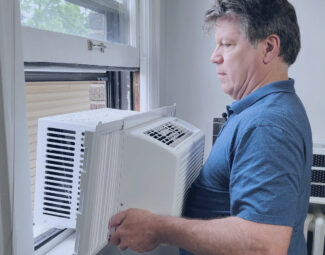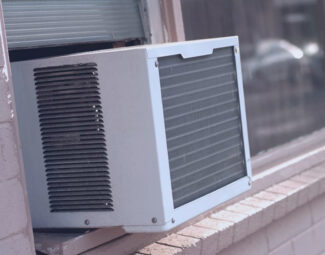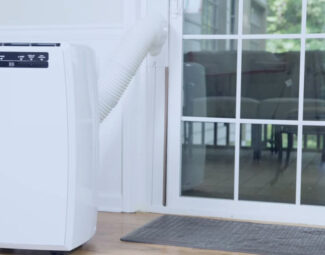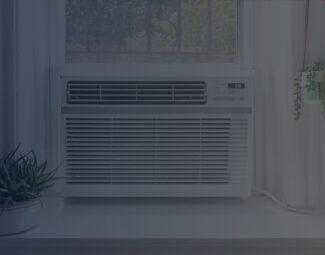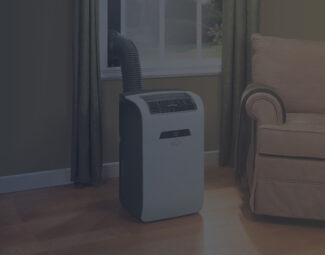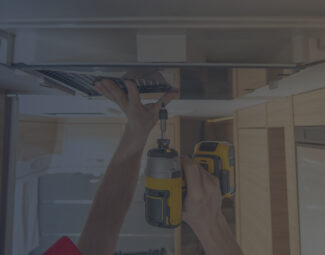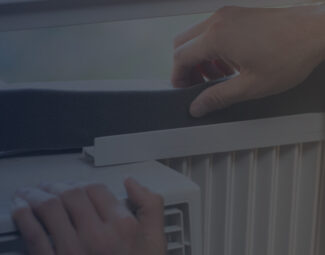T he need for an air cooling system imperious almost everywhere in the world, at one point or another during the year, indoor temperatures rising so much that it becomes unbearable to sit inside without a unit that works to achieve thermal comfort in the room. Two of the most popular options when it comes to air cooling are air conditioners and evaporative air coolers, so the question inevitably arises – which is better and why?
To help you sort out what system works better for you when it comes to keeping your home cool, we will take a deeper look at what both ACs and evaporative coolers bring to the table in the following. Here, we will touch on their functioning, pros and cons, maintenance, and pinning the cooling units against each other for a more simplistic comparison.
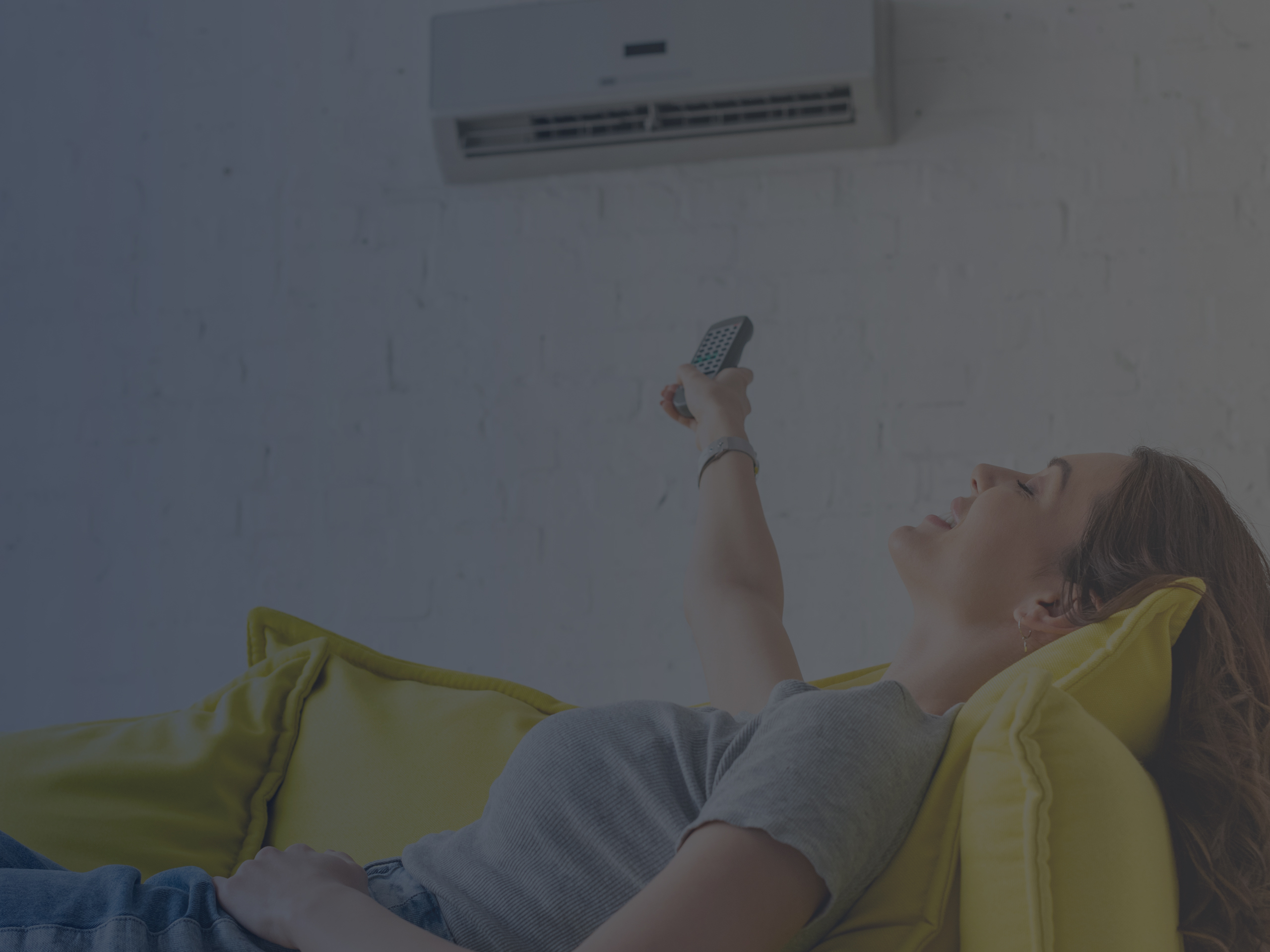
Young Woman Relaxing on Couch and Pointing Remote Control toward AC
Air Conditioner
What does the process of air conditioning imply?
The process of removing heat and dampness from an enclosed area through the use of refrigerant gas to help achieve thermal comfort.
How do air conditioning systems work?
First, we have to take into consideration the fact that the market for air conditioners is quite vast, existing different types of systems to pick from, as follows:
- Portable ACs;
- Window ACs;
- Central ACs.
Although their operation differs, central units being split as the cooling compressor is located outside the building, the main idea when it comes to their functioning is the same. So, how does it work? Well, it uses refrigeration for the process, which implies that it utilizes a fan to draw in hot air that it then passes over the coils that contain the refrigerant. When the hot air encounters the cool coils, the refrigerant pulls in the heat, modifying from a liquid to a gaseous state, later being reverted to its prior state through the use of unwanted heat so that the cycle continues.
*Note: The hot air that is produced during the process is expelled outside or in a separate room through the venting setup.
AC Maintenance Guide
Cleaning and upkeep procedures differ slightly from one AC type to another, but in general, what you need to do to upkeep the system properly is:
- Keep the exterior clean (wipe the unit once every few days, especially if the room is dusty);
- If a moldy smell fills the room when you use it, spray the intake and outflow areas with hydrogen peroxide and let it dry before turning the unit on. This means that mold has grown inside. And, whenever you turn it on, the air fills with mold spores that are especially dangerous for allergy sufferers (clean it daily until the problem is solved);
- Take the filter out and rinse it well under a jet of warm water to clear it of dust and dirt accumulations (clean the filter once per month; in case the room where you place the AC is very dusty or if you have furry pets, perform this maintenance task once every 1-2 weeks);
- Perform deep cleaning as explained here whenever needed (deep cleaning is mandatory on a seasonal basis – perform it before you put the AC to use in summer after it has been on standby for months; if mold growth ever develops and you cannot get rid of it through the aforementioned means, deep cleaning will get rid of the problem);
- Inspect the coils periodically (once every month, preferably) to check for dirt and clean them if needed and to see if a professional check-up is needed, a moment when you should call in a specialized technician.
Benefits
- Preventing a heatstroke: Never worry about the possibility of having a heatstroke or ever feeling uncomfortable because of the heat when you are indoors as the AC rapidly reduces room temperature to provide thermal comfort.
- Easing allergy symptoms: As the unit features an internal filter, it helps reduce pollen, dust, and other allergy-triggering particles from the air by trapping them when it pulls in the hot air from the room.
- Consistent upkeep of your preferred temperature: What all types have in common is that they let you set the temperature that they should maintain. Thus, the unit will work as needed to upkeep thermal consistency.
- Wide variety: Aside from the fact that there are quite enough types of units to pick from when it comes to their design, setup, and portability, you have a wide selection when it comes to cooling capacity as well, so it is a cinch to size the AC to the room.
- Whole-house cooling: With a central AC, you can cool all the rooms inside your house, even being able to set distinct temperatures for different areas as you prefer by using thermostats.
Drawbacks
- Bacteria and mold growth: If you do not clean the AC as instructed, it provides the ideal growing ground for bacteria and mold because of the moisture that accumulates inside of it. Worst of all, the microorganisms and mold spores will be released into the air you breathe, putting your health at risk.
- Dry skin: In an air-conditioned room, the skin tends to lose its moisture, which can lead to dry skin and irritations.
- Costly to run: Generally speaking, these units tend to draw a considerable amount of power when they run, which translates to more expensive electric bills. To prevent this, opt for models with a high EER or energy efficiency ratio, preferably over 10.
Your AC-Related Questions Answered
Question #1: How long does an AC take to cool a room?
Answer: If you size the AC to the room properly, it should not take longer than 20-30 minutes for it to achieve the temperature you have selected.
Question #2: Is it mandatory to vent a portable AC unit out a window?
Answer: Not necessarily. You can vent it in other ways as well, like through the wall, ceiling, chimney, fireplace, or door. What is important is for it to have an outside space where it vents the hot air created in the operating process, or else it won’t manage to lower room temperature.
Question #3: Can I install a window AC unit myself?
Answer: It does not take extensive knowledge to install the system, so you can go ahead and set up the AC yourself. Just make sure to follow instructions closely and beware to secure the system properly.
Question #4: Can I leave it on 24/7?
Answer: It is not recommended to do so as you put too much strain on the unit, causing its lifespan to shorten, and you end up spending a lot of money when the electric bills come as well.
Question #5: What is the expected lifespan of an AC?
Answer: Window-mounted and portable units should last an estimated 10-15 years, whereas central systems can last up to 20 years if maintained and serviced properly.

Young Man in Bed Operating the Evaporative Cooler
Evaporative Cooler
What does the process of evaporative cooling imply?
Among the oldest forms of climate control that are still used today, it uses the process of converting water into vapor through thermal energy in the air so that it lowers the environmental temperature.
How do evaporative air coolers work?
With the help of a fan, it pulls in the surrounding air and passes it through wet filter pads where impurities are trapped and temperatures are lowered through the process of evaporation. The air that has now been cooled off is redistributed back into the room, with the added benefit of it feeling moister (this makes it desirable if you live in a hot, dry area).
Evaporative Cooler Maintenance
This is an aspect that does take out some of your time. To proceed correctly and make sure you benefit from the system for years to come, do the following upkeep tasks:
- Wipe down the casing exterior using a damp cloth to remove any dust and dirt accumulated on it (do this once per week, more often if the environment is very dusty);
- Inspect and replace the cooling pads either on a seasonal basis or whenever needed in case there are cracks in them;
- Use water treatment tablets that you insert in the tank if this is advised in the accompanying manual;
- Clean the basin that contains the water to get rid of mineral residue so that it won’t harbor mold either (preferably do this once per week).
Benefits
- Energy efficient: Consume considerably less power to run as opposed to even the most cost-effective AC system you could think of.
- Effective air filtration: Helps allergy sufferers alleviate symptoms as it traps dust, pollen, and other triggering particles from the air.
- Cheap acquisition: Asking prices do vary from one model to another, but they are generally low, which makes these units accessible to a wider range of customers.
Drawbacks
- Not suited for enclosed spaces: Their need to access fresh air in their operation and the fact that they release humidity makes them better suited for open spaces rather than enclosed environments.
- Non-selectable temperature reduction: As the unit relies on ambient conditions in its quest to lower the temperature rather than letting you select your preferred setting, it is not as efficient at cooling.
- Not usable in humid climates: Through its operation, it releases moisture, causing humidity to rise. If you already live in a damp area, this means that the system could favor mold growth.
Your Evaporative Air Cooler Related Questions Answered
Question #1: Is evaporative cooling good?
Answer: Generally, it is deemed a safe means to cool down the room as it creates a safer and more hygienic environment for those who suffer from allergies.
Question #2: Do I need to keep a window open when it runs?
Answer: Yes, it is preferable to ensure proper ventilation is provided. Otherwise, the air cooler cannot run optimally.
Question #3: How often does it dump water?
Answer: If it is a dump-style drain valve model, expect it to dump water once every 6 to 12 hours, according to the operating setting you have selected.
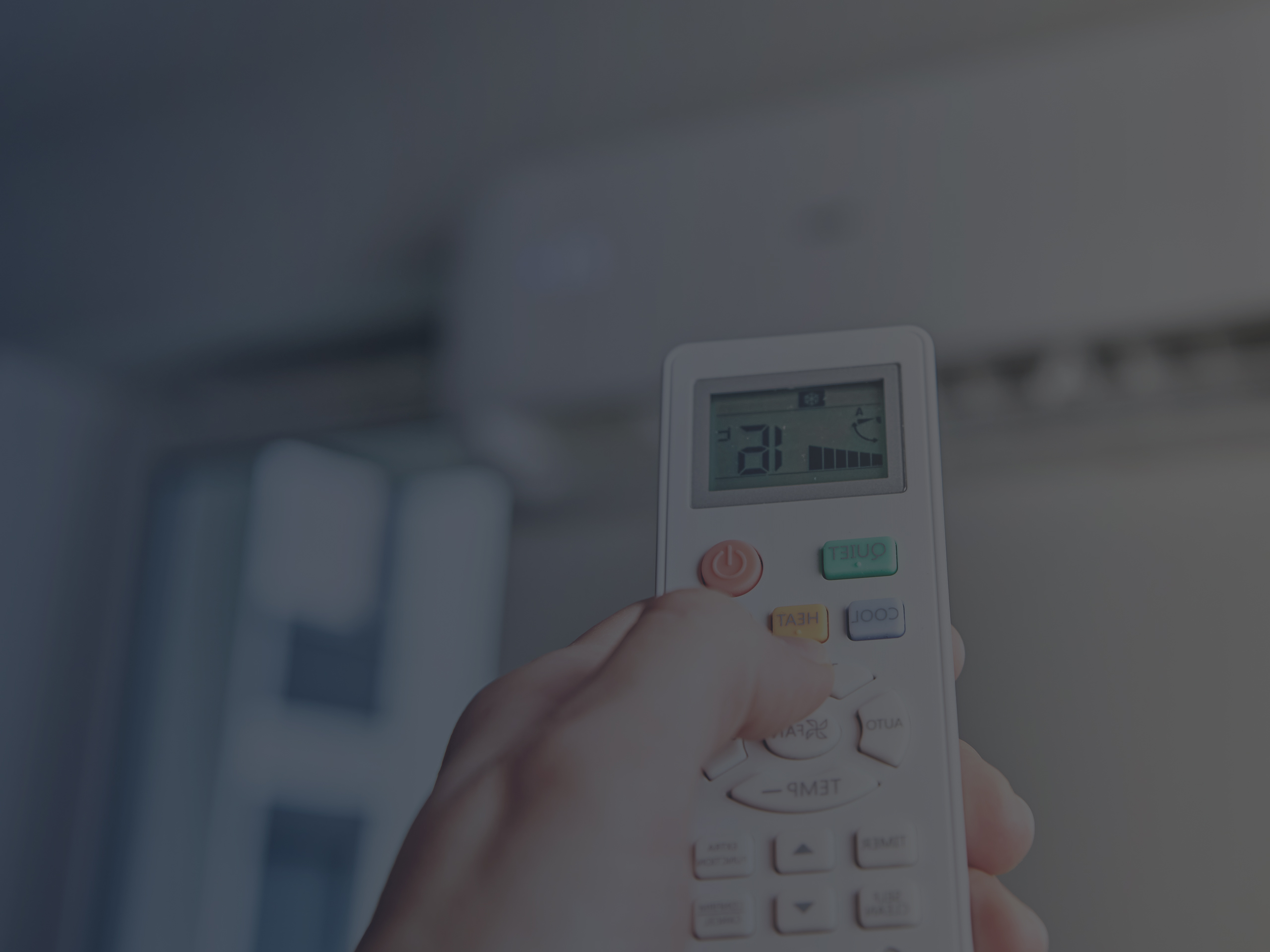
Hand Using Remote Control to Adjust Temperature on Air Conditioner
AC vs. Evaporative Cooler – Side-by-Side Comparison
Air Conditioning Unit |
Evaporative Cooling Unit |
|---|---|
AC unit overall score: 9/10 |
Evaporative cooler overall score: 9/10 |
So…Which Is Better?
Both systems deliver on their promise to cool you off when summer comes, so performance-wise, while there are substantial differences between the two, the pick you make depends on what you ultimately prefer – whether it is the moisture-wicking, rapid cooling provided by the AC, or the moisture-enhancing cooling provided by the evaporative cooler.
As you likely deducted, the climate in which you live is the only factor that ultimately dictates a clear decision between the two, if you live in a hot and dry area, the evaporative cooler being the preferred choice, whereas, if you live in an area where summers are hot and the air gets damp, an air conditioner is a right option.
We do recommend air conditioners over evaporative coolers as these systems provide you with better control over thermal comfort seeing how you can set the temperature for the unit to upkeep, but it depends on you whether or not you consider this differential trait to be substantial enough and determine you to make the same selection.


